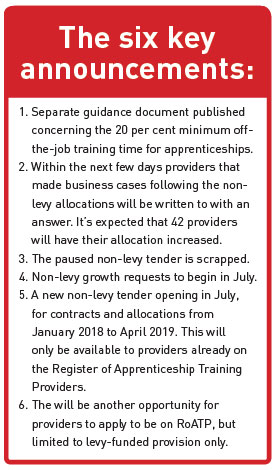Colleges are facing a tough period of transformation, with area review implementation presenting an unavoidable challenge for all, while for some, mergers will be an immediate concern.
As a result, FE leaders like you will be making big decisions that will affect the long-term future of colleges. The opportunities that technology can afford will be among the most important considerations at the start of any period of change, but do you know where to start?
Whether you need to manage a merger, keep pace with the changing learning landscape, develop innovative teaching and learning practices or drive greater financial resilience, embedding digital technology is essential. After all, a digitally-savvy college is an attractive place to work and learn.
Technology toolkits
As the UK’s specialist education technology charity, Jisc is uniquely and ideally placed to help. As a Jisc member, you can benefit from our expertise and a range of tailored digital solutions.
We have already worked with a variety of colleges through the area review process and understand the complexities and challenges. To help, we’ve produced a series of technology toolkits that will help you to understand the technology your college requires, depending on the current level of digital capability.
The products, services and solutions outlined in the toolkits act as a guide in order for you to cross-check in your own college whether you are taking advantage of these.
As the name suggests, our mergers toolkit outlines ways that Jisc can help colleges join together successfully and emerge from the process as efficient, sustainable and high-quality providers of learning and skills. It gives impartial advice to address business-critical issues, ensure reliable, secure network access and maintain transparency on IT costs.
To hear insights and key learnings from colleges who’ve already gone through a merger, Jisc are running a series of free online briefings with the first taking place on 4 July. To register your interest or for further information please email training.technologies@jisc.ac.uk.
Our transformational toolkit is a three-in-one offering. In a trio of separate packages, various digital solutions are grouped together. The basic package – the essentials toolkit – covers budget management, staff training, network security and resources for teaching and learning. The development toolkit adds technology to drive further efficiencies, while the innovation toolkit focuses on more top-line services and products such as learning analytics and migration to cloud computing.
Area review: the digital challenge – a free event
On 2 October in London and 9 October in Manchester, senior leaders have an opportunity to see how integrating digital technology into their plans for change can help achieve organisational goals and enhance the learning experience.
Aimed at colleges that have begun, or are about to begin, implementing area review changes, these free events will help you to:
- Explore digital input at both strategic and operational levels
- Reflect on how digital technology is changing the way organisations operate
- Explore how to lead, manage and influence digitally-driven change across organisations and teams
- Reflect on the potential of digital for a restructuring facility bid
Places are available on a first-come-first-served basis. To reserve a space, register here for London or Manchester.
Delivering a great learning experience
Colleges can’t afford to be complacent about the importance of embedding technology in all aspects of teaching, learning and assessment, as results of a survey Jisc commissioned earlier this year illustrate. The study, among 1,000 16- to 24-year-old learners, found that nearly three quarters (74%) of FE students think technology and digital know-how are important when choosing a course or university, 77% think technology is becoming increasingly important in education, while 76% who think technology is becoming increasingly important – think so because it allows them to submit work easily and makes life more efficient.
Key to the success of any investment in technology is making certain that staff at all levels are competent and confident in using technology, and again, Jisc can help with this too. We support the development of digital capabilities through a series of free Connect More events. These take place throughout June and July across the UK, targeted at those who teach and support learning, who discuss key issues and share best practice.
Contact Us
As a Jisc member, you already have a dedicated account manager who’s available to talk through any area of interest outlined above. You can easily contact your account manager via this link . For merger support, you can contact a subject specialist via email to consultancy@jisc.ac.uk.



